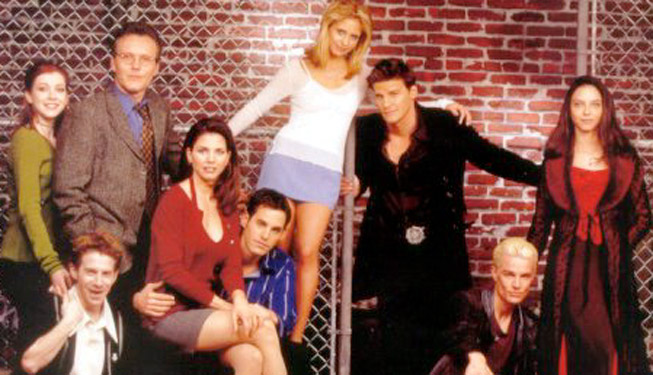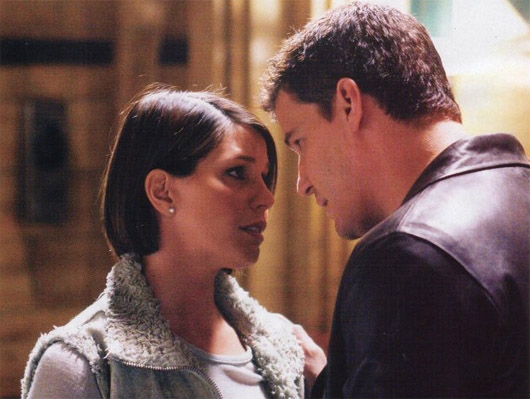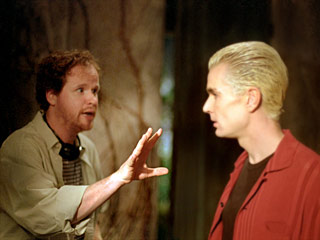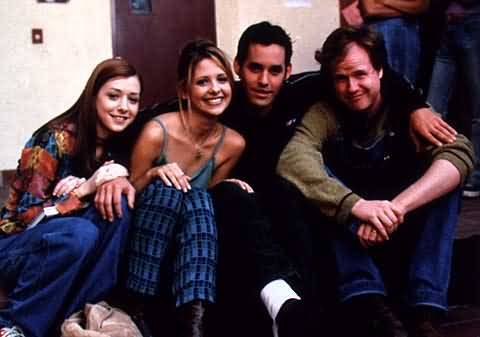 TV
TV « In Which There May Never Be Another Buffy »
 Sunday, April 17, 2011 at 11:25AM
Sunday, April 17, 2011 at 11:25AM 
Full Time
by JESSICA FERRI
Buffy The Vampire Slayer
creator Joss Whedon
Stop for a moment and think about the one person you can completely trust. It could be your partner, it could be your best friend, or a sibling, but most of the time, it’s Mom. Mom coming home from work and going straight to fridge to making something for you to eat, Mom consoling you after you get dumped by a jerk. Mom sending you some extra money when you’re unemployed, or you just can’t quite afford that plane ticket to take a much-needed vacation. Mom. She’s practically a superhero.

We were raised by supermoms. Women who had full-time high powered careers and still made time to get married and have kids. The nineties were a reflection of just how inspiring these women were, and there was influx of art and culture about girl power. We wanted to be as powerful as our moms. A dude named Joss Whedon eventually stepped up to the plate to say that he, too, had been inspired by girl power. 'The very first mission statement of the show was the joy of female power: having it, using it, sharing it." The show was Buffy the Vampire Slayer.

We needed a superhero we could relate to. Mom’s problems are a little different than ours. So Buffy’s more like us. Her problems might be bigger than ours, but that’s intentional. She’s the slayer, the chosen one. But she’s also a regular girl. She’s a high school student. She wants to be popular, she wants a driver’s license, a new outfit, and a date to the Prom. But you can’t always get what you want. You can stake as many vampires as you want, but there will always be more. Which is why you’ve got to have a damn good sense of humor.
It's not just the vamps, either. Your mom thinks you're a delinquent when really you've just been saving the world. Then she shacks up with this sketchy guy who turns out to be a homicidal robot you have to throw down the stairs. Your best male friend is a walking penis and somehow manages to become the sex slave of a giant praying mantis. You lose it to your boyfriend who told you he’d love you forever and then when you wake up the next day he’s turned into a total jerk. Anyone can relate to the fact that being a teenage girl just plain sucks.

Thanks to Buffy’s sidekicks, Xander, Willow, and Cordelia, the show’s a downright riot instead of a complete downer. In one episode, where doppelgangers from a different universe invade Sunnydale, Willow gets a load of her vampire alter ego. "That’s me as a vampire? I’m so evil, and skanky . . . and I think I'm kinda gay!" Buffy herself gets some zingers in there, too. See, one of her superpowers is her razor sharp wit. It catches the vamps off-guard right before she stakes them.
When she has to kill The Master in Season 1, he takes a bite out of her and leaves her for dead. Xander revives her just in time, and the Master, in surprise says, “You’re supposed to be dead!” Her response: "I may be dead, but I'm still pretty. Which is more than I can say for you . . . Ew! You have Fruit Punch mouth!" Then she kills him.
Buffy's cult status is largely reliant on it having its own lexicon. Buffy and her buddies practically speak their own language based on Valley-girl talk. Her stake is "Mr. Pointy" the suffix "-age," can be attached to any word, i.e. "spark-age," excitement is defined in saying "it gave me a happy," awkward-after sex encounters are described as "afterness," creepy things give one "the wiggins," and kisses are "smoochies." I could go on.
A countless number of dissertations and linguistic papers exist on Buffy jargon. The language on the show creates an intimacy between the characters and the fans, like a scared secret, or an ironic knowledge, we’re in on the joke. The quality of the writing on Buffy, especially in terms of character and dialogue, equals that of, say, Seinfeld. Except this isn't a show about nothing. It’s a show about power.

For all its silly creepy-crawlies and funny social situations, Buffy at heart is a primer on survival. Everything and anything can go wrong, and it does every single episode. (There are 144 episodes, so that amounts to a lot of shit going down.) Joss Whedon knows exactly when and how to break our hearts. Friends, family, and lovers can disappoint us. Worse than that, they can die, leaving us to fend for ourselves. In the end, you have to be able to count on yourself, to pick yourself up and just keep moving. It's like Mom. When her marriage fell apart, she kept going. She kept food on the table and she took care of us, no matter what. Wonder Woman doesn't give up.
But she does cry — plenty of that over the course of the show. During the last episode of the fifth season, I felt as if someone had drained all the blood from my body because I was so emotionally destroyed. There are moments in this show that will tear your heart out. And the only way you will appreciate them is by watching the entire series, from beginning to end. Buffy’s about building a relationship with its viewers: one built on trust. When Buffy was on the air (1997-2003), I thought it was about time we had a female Christ. Since she’s disappeared, I keep looking for her to be resurrected. Tarantino, with Kill Bill, and most recently, with Shoshanna in Inglourious Basterds, comes close. But ultimately, there’s no one to take her place. I have come to terms with that.
Jessica Ferri is the senior contributor to This Recording. She is a writer living in Brooklyn. She blogs here, and you can find her website here.

"Not Giving Up On Love" - Armin Van Buuren ft. Sophie Ellis Baxter (mp3)
"Party Talk" - Craft Spells (mp3)
"Realize" - Colbie Caillat (mp3)

 1 Comment |
1 Comment |  1 Reference |
1 Reference |  buffy,
buffy,  jessica ferri,
jessica ferri,  sarah michelle gellar
sarah michelle gellar 





























Reader Comments (1)
Love it... But could we retire "partner"? Cops and detectives and law firms have partners. The rest of us have lovers, spouses, and/or significant others. There's nothing more sterile than to label the other party in a significant relationship as a partner. Ok, I'll stop...